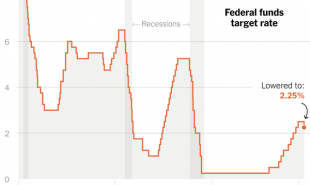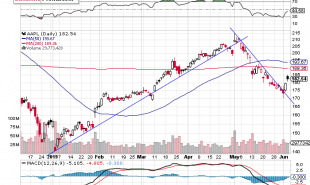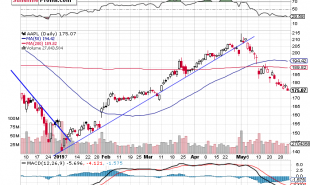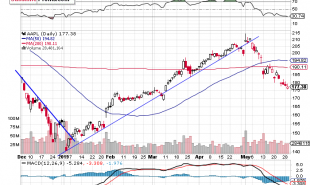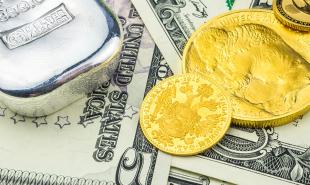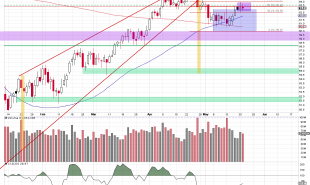
Translated from Russian
“by the end of the year on one of the Chinese stock exchanges may be launched trading futures for oil in RMB, and they can be converted into gold.
A bunch of oil - yuan - gold can become very attractive for investors and oil-producing countries, first of all, those that to some extent conflict with the US. This is Russia, Venezuela, Iran.”
The United States officially notified the World Trade Organization (WTO) that they refuse to recognize China as a market economy country. The European Union is in solidarity with the Americans. The Chinese authorities want to achieve a "market" status for themselves, to get rid of the protective duties on their goods.
Earlier, the US Department of Commerce, as part of an anti-dumping investigation into the supply of Chinese aluminum foil, has already refused to recognize the PRC as a country with a market economy.
In turn, the European Union adopted new anti-dumping rules that allow introducing a special import regime for countries with "significant distortions of the market" and practicing "social and environmental dumping".
These actions, expectedly, aroused the outrage of Beijing. The official representative of the Ministry of Commerce of the PRC noted, for example, that the US statements "are a serious distortion of the real situation in China,
At the same time, he urged the US side to take real steps to correct erroneous actions, "Xinhua News Agency reported.
States constantly conduct anti-dumping investigations against Chinese products and rely on them on the rules applicable to those countries with non-market economies.
So, on November 13, the US Department of Commerce decided that plywood producers from China allowed dumping and received subsidies.
Wang Hejun, Director of the Department of Trade Protection and Investigation of the Ministry of Commerce of the People's Republic of China, said that the anti-dumping investigation continued, "ignoring the obligations to the WTO", to refer to the so-called "counterparts" - a practice that is discriminatory. "
According to him, the Americans refused to consider "evidence materials presented in large numbers by Chinese companies, and due to a distorted view of the production processes at Chinese enterprises, the amount of dumping margin was unreasonably raised."
The Chinese side hoped that the recent visit of US President Donald Trump to the PRC would allow at least part of the trade disagreements. Despite the signing of agreements between the companies of the two countries for $ 250 billion, there was no breakthrough at the state level.
Deputy Foreign Minister of China Zheng Zheguan reported that China is ready to significantly expand access to the Chinese financial sector, reduce tariffs on imported cars, and to relax restrictions on foreign car manufacturers on new energy carriers.
But, apparently, Donald Trump needs everything, not individual concessions. He is convinced that trade relations with China are unprofitable for the US (America imports much more than exports to China), and intends to achieve a change in the situation.Non-recognition of market status, anti-dumping investigations are elements of this economic war.
But China has something to answer. And this answer is not so straightforward, but its effect can be much more effective.
The PRC continues to press the United States on the global foreign exchange market. Earlier, Beijing achieved the inclusion of the yuan in the list of IMF currencies, and now wants to press the dollar as a universal means of calculating oil.
According to the promulgated plans, by the end of the year on one of the Chinese stock exchanges may be launched trading futures for oil in RMB, and they can be converted into gold.
A bunch of oil - yuan - gold can become very attractive for investors and oil-producing countries, first of all, those that to some extent conflict with the US. This is Russia, Venezuela, Iran.
At the same time, Russia is the largest oil supplier to China. By the end of October, shipments totaled 4.65 million tonnes. Saudi Arabia ranks second with 4.61 million tons, the third with 3.57 million tons from Angola.
Analysts say that the sale of oil futures in yuan is an instrument aimed at dedolorization of both the oil market and the entire world economy. True, this process is not fast.
Since the 1970s, OPEC countries have been selling "black gold" in "petrodollars," analysts at Capital Capital said. The wide conversion of petrodollars into US Treasury bonds (treasuries) has been and remains a vital component for the US economy. But from now on, oil producers will be able to take a strategic step in the exchange of oil for gold or treasuries, depending on future expectations.
"In addition, China is going to give a greater share of the market to those countries that will agree to trade oil futures, nominated in RMB. The largest trading partners of the Celestial Empire will actually have to resort to a new instrument to preserve their market share. As a result, we should expect gradual dedollarization, "they note.
The market of this kind of derivatives looks quite promising, says Evgeny Loktyukhov, head of the analysis of branches and capital markets of Promsvyazbank. The growth of its capacity will be fueled by two categories of customers.
First and foremost, this tool will be of interest to some of the professional participants in the oil market, who risk getting problems due to US sanctions. The second category is Chinese speculative capital, which recycles the same yuan, which is very much in China, while opportunities for their conversion into other assets are limited, says Evgeni Loktyukhov. He recalls that the rapid growth of the crypto-currency market was also stimulated in large part by Chinese capital.
"This category of market participants is more likely to be tempted by the subsequent possibility of converting derivatives into gold, which will support the gold market, but it does not necessarily lead to a redistribution of the currency market," he said.
Eugene Loktyukhov believes that the impact of launching a new derivative on the dedollarization of the oil market will be very moderate, and so far it is not worth considering it as a threat to the dollar positions in the world.
At the same time, Andrey Khokhrin, head of the department for work with wealthy clients of IK "Zerich Capital Management", doubts the viability of the mechanism of conversion into gold.
The oil market and the gold market are not comparable in volume, he notes. Therefore, if the conversion into gold is possible, it is not in the metal itself (in that case, it simply will not be enough), but in certain gold derivatives.
"However, the question immediately arises, why such difficulties? After all, when expiring a settlement futures, you can get a yuan, and already buy them gold or gold futures, or gold itself. Therefore, a tool of this complexity is unlikely to be viable. And as soon as any exchange is a very pragmatic participant of trade relations, then there is not much chance of such a tool, "he believes.
At the same time, he agrees that the dollar, obviously, is gradually losing its status as the main currency of exchange. The appearance of the euro, the rapid rise of the Chinese economy, the plans of a number of countries of the former USSR, the Middle East and Asia to switch to settlements in regional currencies made the dollar a measure of value rather than a mandatory currency of transactions.
"And the uninterrupted accumulation of the debt burden by the States, it seems, will only accelerate the loss of the monopoly positions by the dollar," the analyst said.
Dedolorization is a trend of recent times. A lot of attention is paid to this within the BRICS (informal club of Brazil, Russia, India, China and South Africa).
Russian President Vladimir Putin said that Russia shared the concerns of the BRICS countries about the injustice of the global financial and economic system, which does not take into account the growing weight of emerging market countries.
"We are ready to work together with our partners to promote the reform of international financial regulation and overcoming the excessive domination of a limited number of reserve currencies," Putin stressed.
A fresh initiative, in addition to calculations in the national currency and the rapid emergence of petroleum, is the proposal to create a single system of gold trading within the BRICS.
"The traditional system that everything goes through London, partly through Swiss cities, is losing its relevance, and new pockets of gold trade are emerging, primarily in India, China, South Africa. We are discussing, within the BRICS, and at the level of bilateral contacts, the possibility of organizing a single glass, a single gold trade, "Sergey Shvetsov, the first deputy chairman of the Central Bank, said recently.
The Bank of Russia has already signed a memorandum with Chinese counterparts on the development of mutual trade in gold. The first steps to create a new gold trading system can be made next year.
While all these initiatives can not quickly change the dollar status quo. But it is worth remembering that China is taking its steps in the long run.
Read more by MarketSlant Editor


